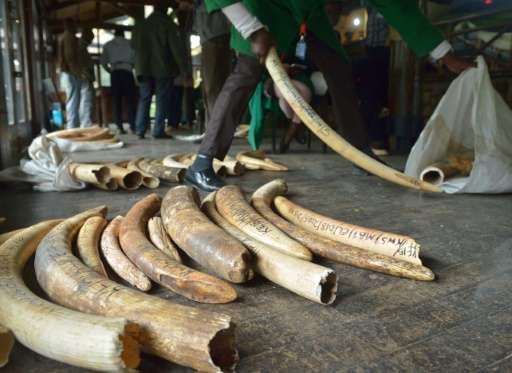UN adopts resolution to fight wildlife trafficking

The UN General Assembly on Thursday adopted a resolution to tackle illegal smuggling of endangered wildlife like elephants and rhinoceros.
While the resolution—the first of its kind—is not legally binding, it reflects worldwide opposition to poaching.
Gabon and Germany sponsored the resolution, which was also supported by more than 70 countries.
The vote also coincide with global outrage over the killing of a beloved lion in Zimbabwe that was allegedly lured from a national reserve outside regular hours and killed by an American hunter.
"This is a historic step made by the international community," said Gabonese Foreign Minister Emmanuel Issoze-Ngondet.
"This phenomenon hampers investment, especially in areas where illicit activities are undertaken and as far as health is concerned it contributes to the spread of viruses," he said.
"It represents a real threat to the stability of our state."
The resolution encourages member states to "adopt effective measures to prevent and counter" wildlife trafficking.
It concerns both regions where wildlife and poachers roam such as in some African countries and consumer countries such as those in Asia that prize ivory and rhinoceros horns.
The resolution also calls for bolstered legislation at the national level to prevent, investigate and prosecute the illegal trade, and make such trafficking a "serious crime."
Issoze-Ngondet called the killing of Cecil the lion in Zimbabwe "a matter of deep concern" for African countries.
"Like most people in the world, we are outraged at what happened to this poor lion," Germany's UN envoy Harald Braun said.
Conservation groups like the WWF and TRAFFIC welcomed the UN vote.
"This is an historic day," said TRAFFIC executive director Steven Broad.
"The world has sent an unequivocal and collective signal at the highest-level that ending wildlife crime is a top priority."
The WWF hailed what it called a "new phase" in the fight against wildlife crime.
"This landmark resolution proves that ending wildlife crime is no longer just an 'environmental' issue and not just limited to a few countries: it has become a priority for every nation," said WWF International director general Marco Lambertini.
Across the African continent, an estimated 30,000 elephants are illegally killed each year to supply the ivory trade, mainly destined for China and other Asian countries.
Ivory trafficking is especially concentrated in Kenya, Tanzania and Hong Kong.
© 2015 AFP




















